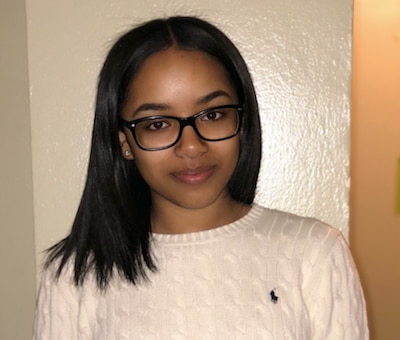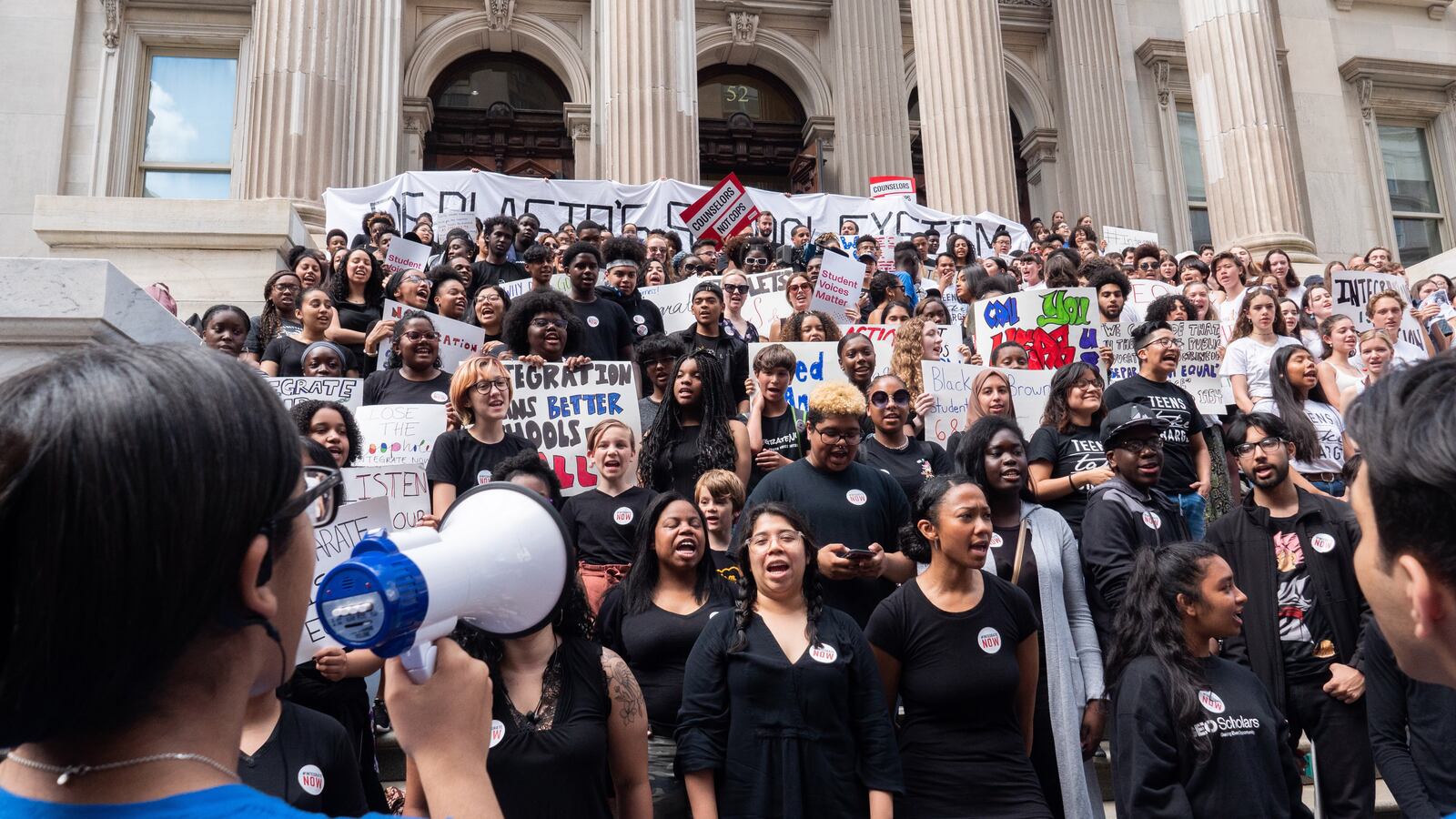Bill de Blasio, the mayor of New York City, has refused to meet with her. He has told her she isn’t “hearing what we’re saying to you.” And he has scoffed at her criticism that his bid for president is a distraction from addressing systemic issues facing the nation’s largest school system.
That thorn in de Blasio’s side: Tiffani Torres, a 16-year-old junior at Pace High School in Manhattan, who has twice appeared on the “Ask the Mayor” call-in segment of WNYC’s “The Brian Lehrer Show.”
Torres lives in Brownsville, Brooklyn, and is an activist with Teens Take Charge, a group that advocates for integrating the city’s public schools, which are among the most segregated in the country. Since taking office in 2014, de Blasio has shied away from the issue, and until recently has virtually refused to use the words “integration” or “segregation.” He has insisted that “diversity” efforts should come from local communities, rather than top-down from City Hall.

Still, de Blasio introduced an ambitious proposal to promote racial diversity at eight of the city’s elite specialized high schools last summer — though activists including Torres have argued it needs to be paired with a more comprehensive desegregation policy. (The mayor has said he’s waiting for a task force to weigh in with recommendations on the issue.)
Chalkbeat caught up with Torres Friday after her latest appearance on the radio show to learn more about how segregation has affected her education, what she hopes her activism will accomplish, and whether the mayor should expect to hear from her in the future.
When did you start calling in to WNYC’s Brian Lehrer show — how many times have you asked the mayor a question?
The last time I called in was in late March — this is the second time that I’ve called in.
Do you have a free period on Friday’s at 10 a.m.? How do you arrange time to make the call?
So the first time I called in I actually did not go to my math class. I had to make up the work after school. This morning, we had advisory trips in school, so I just went into the conference room — I had permission from my principal.
De Blasio has often dismissed your requests on Brian Lehrer: He declined your invitation to meet with him in person. And today, he said you weren’t “hearing what we’re saying to you” when you correctly pointed out the city has no plans to desegregate most city high schools. What have you made of those responses?
I find it very frustrating that he told me we weren’t hearing them because if there’s any organization that is hearing them, it has to be us.
We’ve supported him through the SHSAT — when he presented the reform plan we were right there behind him in support of him. And personally, we’ve attended town halls and hearings, and he has never been there to defend us from the racist remarks that we’ve heard and that we’ve gotten from people attending those town halls and hearings.
He’s kind of just disappeared even though we’ve been there supporting him every step of the way. And for him to say that we aren’t hearing him, I could definitely say the same thing, except me saying that is accurate and him saying that is just deflecting.
What message do you wish he was taking away from you?
I wish I would have gotten the opportunity to tell him that as he continues to deflect and ignore the realities of the situation, there’s going to be another round of ninth grade students that are going to be forced to go through an admissions process that results in this racially segregated school system.
And especially the fact that he basically said that his priority is the SHSAT and middle schools when at the beginning of the phone call I told him that we weren’t going to speak about District 15 or the SHSAT, but we were going to speak about the other 480 public high schools that 95% of students in this city attend. And that is something tangible for him as mayor that he could change, whereas the SHSAT is up to Albany.
Last month, you met with some senior education department officials [including Chancellor Richard Carranza] to press your case — how did that meeting go?
The meeting itself was disappointing, I would say. It was more politician talk than it was action which is what we were hoping to get out of the meeting. So we asked them, everyone in the room to make five commitments, and they only made one, which was to verify the accuracy of the information provided in the high school directory, something they already should have been doing.
What were the other four commitments you were hoping they would make?
So the other four commitments were to: adopt our academic diversity proposal for high schools; to ban the practice of screening students using admissions screens such as in-person interviews and speciality exams; to provide additional resources such as internship coordinators, counselors, laptops, and other resources to schools that are struggling to attract high scoring students, which would help with our academic diversity proposal; and to publish college readiness rates in the MySchools portal.
Tell us a little bit about the rally you planned Thursday to protest school segregation.
Yes, the rally was amazing. Over 400 people showed up, and we planned that rally in two weeks. I had a little emotional moment toward the end because I was starting a lot of the chants and I was kind of in the front. Every time I looked up and everyone started chanting after me, it was just so overwhelming. Those are my two main emotions at this point: overwhelmed and frustrated.
And even people were driving by. One woman rolled down her window and said “yes!” at us and was honking. That’s when I realized it’s not just us, people know this is an issue and people realize that something has to be done.
How do you balance your work as an activist with your other full-time job as a student?
Yeah, I wonder about that sometimes also. Yesterday after the rally I came to the office, and I took a 20-minute nap because I hadn’t slept that much the night before or this whole week, just planning and the rally and doing homework — and I have Regents next week. I’ve been able to do it because I’m passionate about both. I don’t see it as one or the other. I don’t think I balance it perfectly.
How has school segregation affected you personally?
I’ll just reference my high school application process. I was encouraged by my family, my parents specifically, to look for high schools where the most white people went. That’s exactly what I was told.
I was always in a school where most students qualify for free and reduced price lunch and most students have the same background. … We’re taught to believe instinctively that white people are better than us or that people with money are better than us. I’ve even doubted myself. And I’ve doubted the people around me. And I’m not proud of that, but just being in that environment where people think they are ‘less than’ because of the color of their skin and because of the amount of money that they have has taken a toll on me and my education.
How did that factor into your high school application process?
My parents encouraged me to put Pace on my application more so because of the convenience of it. Because I have aunts that live in the area and transportation was easy for me. Well, not easy because I still had to take a bus and a train, but it was easier than other schools that I was focusing on on the Upper East and West side.
Eleanor Roosevelt [a predominantly white school on the Upper East Side] was my first choice high school. And you know about their District 2 priority. I met the academic requirements of the school, like I surpassed the academic requirements of the school and yet because I didn’t live in the district, I was not accepted.
When I learned about the District 2 priority, I was frustrated. I didn’t really understand. I was just like, “Okay this is just their priority. Maybe they don’t want kids to show up to school late” — that’s what I thought! But now I realize it’s a much bigger issue than that and there’s a purpose to that. There’s a purpose of keeping kids who don’t live in that district out of that school.
Should the mayor expect to hear from you next Friday morning?
I don’t know, it’s pretty spur of the moment when I decide to call [laughs]. Maybe, maybe.
I think it’s up to him what we do next. I can call in all that I want to, but if they’re just going to continue to cut me off and I’ll only get a sentence in there then I don’t think we need any more words exchanged… I think we just need action.

